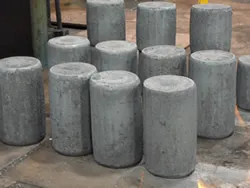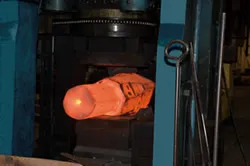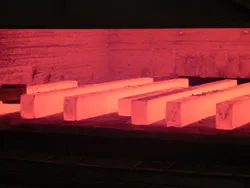Custom Open-Die Forgings



Open die forging is the process of forming and shaping metals by hammering, pressing or rolling. The process begins with starting stock, usually a cast ingot (or a "cogged" billet that has already been forged from a cast ingot), which is heated to its plastic deformation temperature, then upset or "kneaded" between dies to the desired shape and size.
If you have any questions regarding our custom forgings, contact us, or request a quote for an in-depth price analysis.
Start Your QuoteThe Open Die Forging Process
Open-die forging is a metalworking process that can produce a wide range of custom shapes, including bars, shafts, cylinders, discs, and rings. Within the hot open-die forging process, the cast coarse grain structure of the metal workpiece is broken up and replaced by finer grains. Low-density areas, micro shrinkage, and gas porosity inherent in the cast metal are consolidated through the reduction of the ingot, achieving sound centers and structural integrity. Mechanical properties are therefore improved by eliminating the cast structure, enhancing density, and improving homogeneity. Open die forging also allows the grain flow to obtain desired directional strengths. Secondary processing, including heat treating and CNC machining, can further refine the part.

Open Die Forging vs. Closed Die Forging
While both open-die forging and closed-die forging are standard methods for producing forged metal components, there are important differences in these forging processes. A closed die forging confines the metal in dies. In contrast, an open die forging metal is never entirely confined or restrained in the die. Most open-die forgings are produced on flat dies. However, round swaging dies, V-dies, mandrels, pins, and loose tools are also used depending on the desired part configuration and size. Other key differences between open-die forging and closed-die forging include:
- Open-die forging produces less waste as excess material can be trimmed and reused
- Open-die forging can produce a better grain structure in the metal
- Open-die forging is suitable for large and complex parts, while closed-die forging is better suited for small and medium-sized components that require high precision and tight tolerances
- Closed-die forging can sometimes produce high-volume parts more efficiently
Advantages of Open Die Forging
While some applications favor both forging methods, open-die forging offers several advantages for the custom pieces we manufacture at Great Lakes Forge. For example, open-die forging is often associated with larger, simpler-shaped parts such as bars, blanks, rings, hollows, or spindles. Open-forging can also be considered the primary option for "custom-designed" metal components. Open-die forging can produce high-strength parts in sizes ranging from a few pounds to hundreds of tons. Additional advantages of open-die forging include:
- Flexibility in shaping
- No need for complex tooling resulting in lower production costs
- Reduced material waste
- Better grain structure
- Improved strength, toughness, and ductility of the finished piece
Open-Die Forging Capabilities at Great Lakes Forge
As a premier custom open die forging manufacturer, Great Lakes Forge's facility can produce individual forgings at weights up to 4,000 lbs. Using our 750-ton Bliss press, we can fabricate products from 3.5" to 18" in diameter and thickness, and up to 120" in length. Our custom open die forging services can create:
- Custom forged crankshafts
- Stainless steel forgings
- Forged steel shafts
- Forged blocks
- Forged rectangles and flats
- Forged rounds, discs, and sleeves
Custom Open Forging Metal Options
As a custom open die forging manufacturer, our services are ideal for prototypes and short production runs. Our quality-controlled heat treatments and in-house machining ensure your finished product is of the highest quality. Great Lakes Forge offers custom open-die forgings for a variety of metals, including stainless steel, carbon steel, and various alloy metals.
In addition, our open die forgings can be produced to specifications for metal alloys, including AISI, ASTM, AMS, API, SAE, ASME, AWS, JIS, and GB. We custom-manufacture forged shapes and heat-treated conditions to achieve critical physical properties, such as tensile, yield, elongation, and area reduction for the desired end-use as specified by the purchaser.
Open Die Industrial Forging Video
As your custom open-die forging manufacturer, Great Lakes Forge is proud to provide this video of a forged rectangle and forged round being worked on through open-die forging within our facility.
Start Your QuoteContact Us Today for Your Custom Industrial Open Die Forging Needs
At Great Lakes Forge, we have the experience, the resources, and the capabilities to meet or exceed all your custom open-die forging needs. Contact Great Lakes Forge today for more information or to request a quote.
As a trusted open-forging manufacturer, we specialize in creating custom open-die forged components, including flats, discs, stepshafts, and more. We work with over 200 materials, producing parts forged from various grades of steel, stainless steel, and other high-performance metals. Located in Traverse City, Michigan, we serve customers nationwide by producing open-die forged custom parts designed and manufactured to meet our customers' requirements. Choose Great Lakes Forge to provide you with custom open-die components crafted to your specifications.




